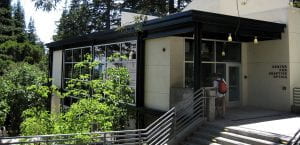
The Center for Adaptive Optics is a Science and Technology Center that was funded for 10 years by the National Science Foundation (NSF) and is now funded by the University of California Santa Cruz. Its mission is to advance and disseminate the technology of adaptive optics (AO) in service to science, health care, industry, and education. Its goal is to lead the revolution in AO by developing and demonstrating the technology, creating major improvements in AO systems, and catalyzing advances nationwide. The CfAO runs the annual AO Summer School and Fall Retreat. Since the retirement of the CfAO’s long-time director, Prof. Claire Max, in 2022, the CfAO has been led by Prof. Rebecca Jensen-Clem.
The CfAO implemented a highly successful education and workforce development program which became the Institute for Scientist and Engineer Educators (ISEE) at the University of California Observatories. ISEE includes programs developed by the CfAO that have continued now for more than two decades. The Professional Development Program (PDP) prepares graduate students and postdocs to be inclusive and effective in their teaching, mentoring, leadership and other professional skills. The impact of the program has been published in two volumes and several technical reports, and the field of astronomy now has hundreds of alumni rising into leadership positions across the U.S. and beyond. The CfAO developed and continues to lead the Akamai Workforce Initiative, aimed at developing a local workforce for astronomy facilities in Hawai’i by placing local college students at observatories for summer internships. More than 500 students have completed the program and 88% of Akamai alumni have stayed in STEM, including alumni who are underrepresented. Outcomes have been published and earned the program a presidential mentoring award (PAESMEM).The CfAO is building on UC’s strong leadership in AO by connecting UC campuses, by fostering research collaborations across disciplines, and by developing the next generation of young leaders in this field.
The Center brings together UC astronomers and vision scientists, today’s primary users of AO, with UC engineers and technologists who design and construct these systems. A hardware-based outgrowth of the center, the Laboratory for Adaptive Optics within UC Observatories, was established through a $9 million grant from the Gordon and Betty Moore Foundation. This state-of-the-art laboratory explores new AO techniques, develops and tests new components, and provides training for our students and postdocs.
